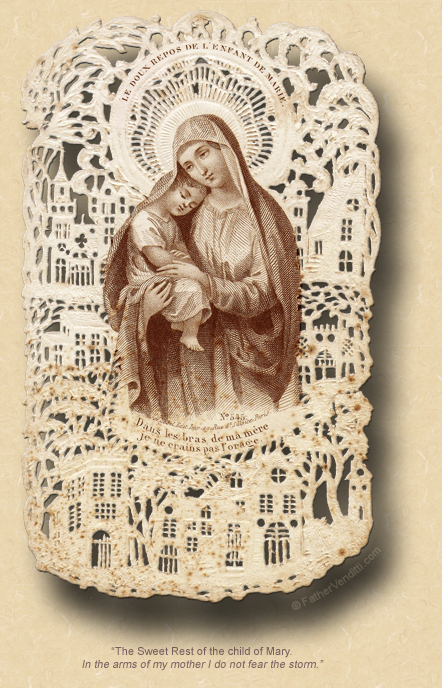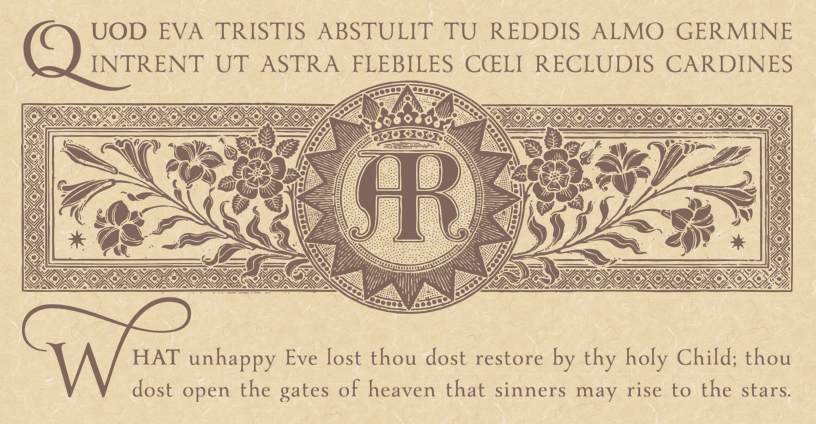The Crisis Through Which We Pass.
The Twentieth Saturday of Ordinary Time; the Memorial of Saint Louis; the Memorial of Saint Joseph Calasanz, Priest; or, the the Saturday Memorial of the Blessed Virgin Mary.*
Lessons from the secondary feria, according to the ordinary form of the Roman Rite:
• Ezekiel 43: 1-7.
• Psalm 85: 9-14.
• Matthew 23: 1-12.
|
If a Mass for the memorial of St. Louis is taken, lessons from the feria as above, or from the proper:
• Isaiah 58: 6-11.
• Psalm 112: 1-9.
• Matthew 22: 34-40.
…or, any lessons from the common of Holy Men & Women for One Saint.
|
|
If a Mass for the memorial of St. Joseph is taken, lessons from the feria as above, or from the proper:
• I Corinthians 12: 31—13: 13.
[or, I Corinthians 13: 4-13.]
• Psalm 34: 2-11.
• Matthew 18: 1-5.
…or, any lessons from the common of Holy Men & Women for Educators; or, the common of Pastors for One Pastor.
|
|
If a Mass for the Saturday memorial of the Mother of God is taken, lessons from the feria as above, or any lessons from the common of the Blessed Virgin Mary.
|
The Third Class Feast of Saint Louis, Confessor.
First & third lessons from the proper, Gradual from the common "Os Justi…" of a Confessor not a Bishop, according to the extraordinary form of the Roman Rite:
• Wisdom 10: 10-14.
• Psalm 91: 13-14, 3.
• Luke 19: 12-26.
FatherVenditti.com
|
 2:29 PM 8/25/2018 — It's important to note that our Lord doesn't challenge the authority of the Scribes and Pharisees; quite the contrary, they sit “on the chair of Moses,” says our Lord, and charges His followers to “observe all things whatsoever they tell you, but do not follow their example” (23: 2-3 NABRE). 2:29 PM 8/25/2018 — It's important to note that our Lord doesn't challenge the authority of the Scribes and Pharisees; quite the contrary, they sit “on the chair of Moses,” says our Lord, and charges His followers to “observe all things whatsoever they tell you, but do not follow their example” (23: 2-3 NABRE).
That's an important distinction for all of us, especially now with all the bad news to which we’ve been subjected recently. How often do we find ourselves griping and moaning about the Pope, about the Bishops, about priests, and often rightly so; but, we always, thank God, manage—one hopes—to stop ourselves shy of judgmental-ism because we know that we're all in the same boat. We're all human, and no one of us can claim to know what another will face when standing before the judgment seat of Christ. As one very wise priest once told me when I was complaining about someone: “You don’t know what experiences of life went into making that person what he is as opposed to what he should be, or what you think he should have been. God alone knows this, and God alone will be his judge.” We've got enough of a job purifying our own souls; we don't need to be policing everybody else's.
As someone said to me the other day: what the Church needs more than anything else right now is prayer, and prayer can’t arise out of anger. It can only arise out of love, and love can’t be selective; it has to be unconditional or else it isn’t really love. That doesn’t take away the pain of the suffering, or whatever emotions we feel over which we have no control. But, like our Lord said to us on a Sunday not too long ago, the wheat and the weeds grow up together; they are not separated until after the harvest. We don’t like that, because we want the guilty to get their cummupence before our very eyes, but that is not—nor ever been—part of our Lord’s plan.
As our Lord says, the Scribes and Pharisees sit on the seat of Moses, which is why they must be obeyed even if their own personal conduct is not virtuous. By the same token, a bishop of the Catholic Church may be an extremely flawed person, and maybe even a criminal; but, what he teaches in the name of Christ is still binding on us because of the sacrament that makes him a bishop, which has nothing to do with his personal holiness. By the same token: a priest in the state of mortal sin says Mass for his parish, and the Eucharist he consecrates is still valid even though he may very well go to hell when he dies.
Of course, all of you know this already; people who go to daily Mass know these things. It’s the Sunday-only Catholics who don’t understand this kind of stuff, which is why we must not shy of explaining it to them if or when they approach us. So let’s pray, in this Mass, that the current crisis through which we pass will be a purifying experience for the Church, as it should be; and, that the Mother of God and Mother of the Church will continue to spread her mantle of protection over the Church and over each of us as individuals.

* The only King of France to be canonized a saint, Louis IX (1214-1270) was a model ruler and the father of eleven children. He was a Fransican tertiary who cared especially for lepers, and built Sainte Chapelle in Paris as a reliquary for the crown of thorns, probably the most beautiful Gothic church in the world. He died of the plague near Tunis while participating in the Second Crusade, and is recognized as the patron of masons and sculptors.
Born in Aragon in Spain, Joseph Calasanz (1557-1648) founded, in 1617, the Clercs Regular of Religous Schools, known today as the Piarists, dedicated to the education of poor children. Today, they number around 1,375. During his lifetime, he suffered many trials, mostly from within the Church herself, which was fond of accusing him of all sorts of moral atrocities, even having his institute suppressed for a time. Officially, he is regarded as the patron of all Christian schools dedicated to the children of the poor, but he should be recognized as the patron of all priests who have been unjustly accused.
|

